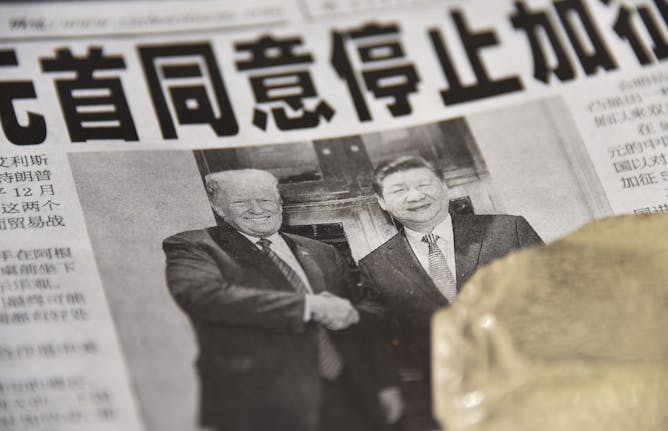|
What happens in American politics has deep implications for the rest of the world, and looking at foreign media coverage of the race – especially in places that have strict state control of media like China, Russia and Iran – can give you a pretty good idea of what different countries think about the candidates.
A team of researchers tracked over 20 prominent news outlets in China, Russia and Iran, using algorithms to identify key narrative themes in the coverage. They did the same exercise in 2016. Back then, Trump was an unknown, and some foreign media were bullish on the former reality TV star.
Now? Those same state-run media outlets have started to change their tune.
Also today:
|

Chinese outlets that once relayed cautious optimism over Donald Trump’s deal-making abilities now express exasperation over his chaotic style.
Greg Baker/AFP via Getty Images
Robert Hinck, Monmouth College; Robert Utterback, Monmouth College; Skye Cooley, Oklahoma State University
In 2016, America's adversaries seemed to cheer electoral chaos and a withering faith in democracy. Now they seem to be hoping democracy can topple a leader they've grown loathe to deal with.
|
Ethics + Religion
|
-
Joanne M. Pierce, College of the Holy Cross
Taking oath is an important tradition before assuming charge of a public office. It entails a commitment to the future. What is the history of oath-taking?
-
Paul Thomas, Radford University
Donald Trump said followers of the conspiracy theory 'are very much against pedophilia.' What he didn't mention was the demonic imagery and language that peppers QAnon posts.
|
|
Politics/Election '20
|
-
Muqtedar Khan, University of Delaware
Biden and Trump are like night and day on foreign policy, and American global engagement would change radically under a Biden presidency. But actual Mideast policy might show only cosmetic changes.
-
Bruce Peabody, Fairleigh Dickinson University
Though critics claim Amy Coney Barrett's nomination jeopardizes the high court's legitimacy, research shows there are ways the judiciary can bolster its standing and weather controversial decisions.
-
Jennifer M. Piscopo, Occidental College; Peter Siavelis, Wake Forest University
On Oct. 25 Chile will decide whether to replace its dictatorship-era constitution with a new one written wholly by the Chilean people. The vote shows how protests can change the course of a nation.
-
Donald Nieman, Binghamton University, State University of New York
The framers of the Constitution were very clear that presidential terms have time limits. Not four years and a day. Not three years and 364 days. Four years.
|
|
Education
|
-
David L. Di Maria, University of Maryland, Baltimore County
An effort by the Trump administration to put stricter limits on students and scholars from certain countries may cost a lot and accomplish little, an international education expert argues.
|
|
Environment + Energy
|
-
Robert J. Orth, Virginia Institute of Marine Science; Jonathan Lefcheck, Smithsonian Institution; Karen McGlathery, University of Virginia
Healthy seagrasses form underwater meadows teeming with fish and shellfish. A successful large-scale restoration project in Virginia could become a model for reseeding damaged seagrass beds worldwide.
|
|
Economy + Business
|
-
Abhishek Bhati, Bowling Green State University
Using a common tool for measuring subconscious stereotypes, a scholar assessed how bias against dark skin can influence an inclination to support a charity serving people in low-income countries.
|
|
From our international editions
|
-
Benjamin Maiangwa, University of Manitoba
The fact that the colonial system was essentially a commercial expedition meant that the outcome was the creation of corporate entities rather than nation states.
-
Angus McNelly, Queen Mary University of London
Exit polls suggest Luis Arce, a former finance minister under Evo Morales, has won Bolivia's presidential elections.
-
Lara Herrero, Griffith University; Eugene Madzokere, Griffith University
We still don't know how long the coronavirus lasts on surfaces in real-world conditions, such as on objects in the home, at work or in the supermarket.
|
|